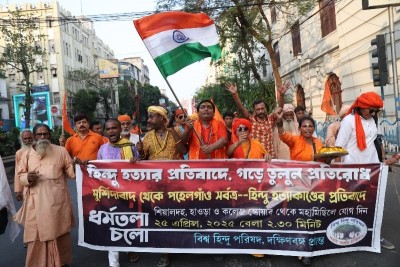 Khalistan
Khalistan
Punjab wants to progress and not Khalistan
Across the glittering screens of smartphones, a noxious weed takes root. Fueled by algorithms and anonymity, a brand of “long-distance nationalism” thrives, one nurtured not by boots on the ground, but by the echo chambers of social media.
This is the Long-Distance Nationalism of the Khalistan extremist, a warped ideology that seeks to sever Punjab from India, not through the sweat and sacrifice of on-ground struggle, but through the poisonous seeds of online hate.
Their targets? Young, impressionable Sikhs, bombarded with a distorted narrative of historical grievances and present-day persecution. The reality, however, paints a far grimmer picture – one not of Indian oppression, but of Punjab grappling with issues far more immediate and urgent than the ghosts of a bygone era.
Drug addiction, a silent epidemic, claws at the heart of Punjabi society. In 2020, over 1.3 lakh addicts sought treatment, a testament to the crisis gripping the state. Joblessness stares countless youths in the face, pushing them towards desperation and despair. The unemployment rate in Punjab stands at 7.1%, nearly double the national average. These are the real battlegrounds, not the figments of online warriors.
Despite the Centre and state’s efforts to revitalize Punjab, Khalistani extremists remain stuck in a web of online hatred. Instead of offering a hand to rebuild their homeland, they spew hate from distant shores, a cynical echo chamber devoid of concrete solutions for the state’s pressing issues. Their silence on Punjab’s real struggles speaks volumes: theirs is a movement fueled by division, not the progress and prosperity desperately craved by the people they claim to represent.
Khalistani separatists, many comfortably ensconced in foreign lands for years, offer no concrete vision for their promised utopian state. How will they make the proposed ‘land-locked’ Khalistan an economically viable and growing state? What magic wand will conjure up jobs for its disillusioned youth? These are questions conveniently left unanswered, lost in the cacophony of online vitriol.
The silence is deafening because the truth is, Khalistan has no answers. It’s a mirage shimmering in the heat of grievances, a theocratic state dreamt up by those far removed from the ground realities of Punjab. The people of Punjab, grounded in the fertile soil of their homeland, have little time for such ethereal fantasies. They are busy navigating the potholes of unemployment, battling the demons of addiction, and dreaming of a better future within the vibrant tapestry of India.
In the early 90s, India embarked on a journey to become an economic powerhouse through a globalization strategy. Unfortunately, the state of Punjab was unable to fully capitalize on these opportunities due to the disruptive impact of Khalistan-related violence and unrest. Instead of focusing on developmental projects, the government’s resources were diverted towards containing the situation.
This diversion of resources during a critical period may have contributed to the lingering issue of unemployment in the state, as there were limited investments at that time. As India aims to achieve a $5 trillion economy, Punjab continues to face challenges posed by Khalistan-related disruptions, despite the disinterest of Sikhs in India who have no desire for Khalistan.
Presently, the people of Punjab aspire to be active participants in India’s growth story. They reject the idea of secession and instead seek inclusion, desiring a rightful place at the table of a prospering nation. In the current landscape of a dynamic and growing India, the citizens of Punjab recognize the vast opportunities and progress that lie ahead, far beyond the constraints of an insular theocratic, land-locked state.
The Long-Distance Nationalism of Khalistan extremism is a dangerous delusion, one that exploits the pain of a community for its own nefarious ends. It’s time to pull the plug on this digital charade, to expose the emptiness at its core. The real challenges lie not in carving up borders, but in tackling the issues that truly afflict Punjab. Let us focus on those, together, as Indians, and build a brighter future for all.
(Image and text courtesy: Khalsavox.com)
Support Our Journalism
We cannot do without you.. your contribution supports unbiased journalism
IBNS is not driven by any ism- not wokeism, not racism, not skewed secularism, not hyper right-wing or left liberal ideals, nor by any hardline religious beliefs or hyper nationalism. We want to serve you good old objective news, as they are. We do not judge or preach. We let people decide for themselves. We only try to present factual and well-sourced news.







